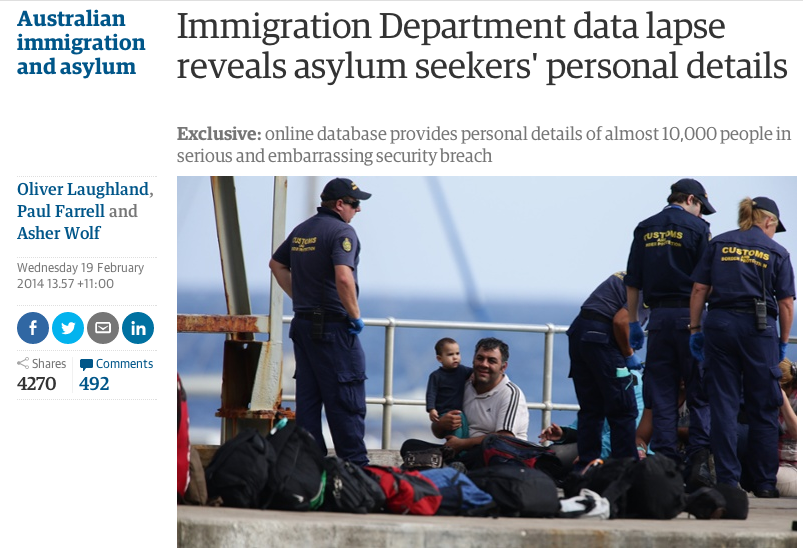Asylum seekers who had private information published by the Department of Immigration have not been provided with all the details of the breach, hampering their visa claims and increasing their risk of refoulement, a lawyer representing them has alleged.
Solicitor and Registered Migration Agent Michaela Byers is acting on behalf of approximately 1,700 asylum seekers who have lodged a complaint with the Australian Privacy Commissioner after the Department of Immigration accidentally published private records including their names, countries of origin, and detention details.
Byers told New Matilda that the publication of the information had left some of her clients at risk of being identified and potentially persecuted on return to their countries of origin, but that the Department’s refusal to provide details on who had accessed the information was limiting their ability to put that case in full while applying for Australian visas.
“We want them released from detention, allowed to do a visa application, and for the Department to release all its information about the data breach,” Byers said.
The Privacy Commissioner last week handed down a damning report which found a copy pasting error had led to the private details of close to 10,000 asylum seekers being published on the Department’s website.
The breach went unnoticed until Guardian Australia discovered it and alerted the Department.

However, Byers said her clients were now struggling to prove to the Department’s caseworkers that the breach had put them at greater risk, should they be returned to their countries of origin.
“The Department and the Refugee Review Tribunal have come back and said that our submissions have been speculative…of course they have been speculative, we haven’t had access to the information,” Byers said.
“Some of our Iranian clients, their families’ houses have been bulldozed and their fathers have been imprisoned, and it all happened after the data breach.”
Byers said a conflict of interests now existed as the Department’s own employees are currently assessing the impact of the Department’s breach on various asylum claims. She argued the claims should go before an independent body.
“They’re not going to make a finding against their employer,” she said.
A Guardian Australia investigation found the accidentally published information had been downloaded in 16 countries outside Australia including Egypt, China, Malaysia, Pakistan and Russia.
The Asylum Seeker Resource Centre’s Director of Advocacy Serina McDuff condemned the government for allowing the breach to occur and failing to adequately address the concerns it raised.
“The Department’s continued ill-treatment of the 10,000 people affected by its dangerous incompetence is shameful,” she said in a media release.
“The Minister must guarantee that those affected will not be returned to harm or persecution in their home country.”

In response to the Privacy Commissioner’s investigation, the Department of Immigration has implemented a number of changes to improve its handling of private information.
The nearly 1,700 asylum seeker who have signed on to the Privacy Commissioner complaint are currently waiting for a response from the Department.
In a separate legal action arising from the same breach, a smaller group have taken the Department to the Federal Court in an attempt to sue for breach of privacy. No tort of privacy exists in Australia and, if successful, their case could have broad legal implications extending far beyond migration law.
Byres told New Matilda that one of her clients, an Indonesian woman being held in the Wickham detention centre, had faced deportation despite being part of the action before the Privacy Commissioner. The deportation was only halted after the woman joined the other Federal Court case.
“For most people it’s not the compensation they want, they just don’t want to go back to their home country,” Byres said.
The Department of Immigration had not responded to request for comment at time of publication.
Donate To New Matilda
New Matilda is a small, independent media outlet. We survive through reader contributions, and never losing a lawsuit. If you got something from this article, giving something back helps us to continue speaking truth to power. Every little bit counts.



